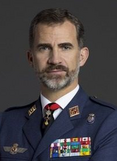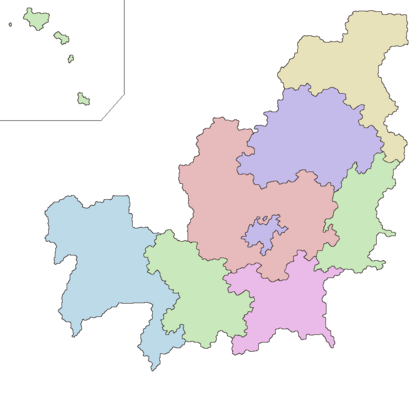Mirina: Difference between revisions
m (Deleting old Tigulian lore) |
m (Including the Privy Council's heightened role, absolutism, and updating the devolved administrations) |
||
| Line 175: | Line 175: | ||
===Government=== | ===Government=== | ||
Mirina utilises a system of parliamentary government . The [[Stat Gindral of Mirina|Stat Gindral]] of | Mirina utilises a system of parliamentary government . The [[Stat Gindral of Mirina|Stat Gindral]] consists of two houses: an elected General Council and a appointed Grand Council. Unlike many other constitutional monarchies, it is not conventional for royal assent to be granted to all bills, though royal assent is not required for legislation to come into force. | ||
The | The head of government of Mirina is the {{wp|prime minister|premier}} ([[Mirine language|Mirine]]: ''Dombra Pristent Kunkeli'', Lord President of the General Council). The premier is described by the constitution as an individual who has the confidence of the monarch, and "the ability to create and promulgate a legislative and budgetary program." | ||
The | The premier is considered the 'first among equals' among ministers, and appoints a cabinet to oversee various governmental departments. While the constitution grants executive power to the prime minister and cabinet, any decision reached must be given assent by the Privy Council. The current premier is Ntoni Mitisalikari, leader of the [[Alydian People's Party]], who has been in office since 12 June 2014. | ||
The Privy Council is composed of the monarch, the great officers of sttae, and privy councillors appointed on order of the monarch. The current Lord President of the Privy Council is [[Filip, Duke of Kulumbra|Duke Filip]], who also exercises the powers of the monarch during the [[Regency of Mirina|current regency]] | |||
===Devolved administrations=== | ===Devolved administrations=== | ||
Mirina, Pontra, Tembra | Mirina, Mirina-La Makra, Iulan, Mabreta, Visteli, Paluda, Pontra, Tembra, and Apia each have their own government and executive, led by a president and a devolved bicameral legislature. | ||
{{MirinaAdminDivisions}} | {{MirinaAdminDivisions}} | ||
Latest revision as of 23:01, 10 May 2020
Crown of Mirina Kurun di Mbrin Mirinko Koroa | |
|---|---|
| Motto: Mi Mar, Vos Rega My sea, your king | |
| Capital and | Iulan |
| Official languages | Mirine |
| Government | |
• Queen | Imeli II |
| Filip, Duke of Kulumbra | |
| Ntoni Mitisalikari | |
| Legislature | Stat Gindral |
| Grand Council | |
| General Council | |
| Population | |
• 2019 census | 23,451,265 |
Mirina (Mirine: Mbrin), officially the Crown of Mirina (Mirine: Kurun di Mbrin)
Etymology
History
Prehistory
Antiquity
Middle Ages
Early Modern
Lavender Revolution and Li Ristultiun
Contemporary period
Geography
Politics
Mirina is a unitary state under a constitutional monarchy. The current monarch is Imila II, who acts as the head of state. The constitution grants the monarch a wide berth of executive and ceremonial powers. The monarch presides over the Privy Council; appoints the premier, by convention from the largest political party, and on recommendation from the latter appoints the members of the government. The monarch is also granted the power to terminate the tenure of any minister, and to unilaterally dissolve parliament, suspend the constitution, call for new elections, or rule by decree. Formally the monarch is commander-in-chief of the armed forces.
Currently Mirina is considered to be a hybrid regime, with the 2018 Asuran Freedom and Liberty Index report describing the country's constitution as allowing "an autocracy dressed as a democracy." Critics of the current regime have asserted that legislative oversight of the regency of the Duke Filip is non-existent.
Government
Mirina utilises a system of parliamentary government . The Stat Gindral consists of two houses: an elected General Council and a appointed Grand Council. Unlike many other constitutional monarchies, it is not conventional for royal assent to be granted to all bills, though royal assent is not required for legislation to come into force.
The head of government of Mirina is the premier (Mirine: Dombra Pristent Kunkeli, Lord President of the General Council). The premier is described by the constitution as an individual who has the confidence of the monarch, and "the ability to create and promulgate a legislative and budgetary program."
The premier is considered the 'first among equals' among ministers, and appoints a cabinet to oversee various governmental departments. While the constitution grants executive power to the prime minister and cabinet, any decision reached must be given assent by the Privy Council. The current premier is Ntoni Mitisalikari, leader of the Alydian People's Party, who has been in office since 12 June 2014.
The Privy Council is composed of the monarch, the great officers of sttae, and privy councillors appointed on order of the monarch. The current Lord President of the Privy Council is Duke Filip, who also exercises the powers of the monarch during the current regency
Devolved administrations
Mirina, Mirina-La Makra, Iulan, Mabreta, Visteli, Paluda, Pontra, Tembra, and Apia each have their own government and executive, led by a president and a devolved bicameral legislature.
| Mirina | Iulan | Mirina-Li Makra | Mabreta | Visteli | Pontra | Tembra | Paluda | Apian Isles | |
|---|---|---|---|---|---|---|---|---|---|
| Flag | |||||||||
| Capital | Siul | Iulan | Badaisa | Skipiun | Kuloni | Ramani | Midrani | Kratagna | Brak |
| Parliament | Krut Gindral of Mirina | Iunt of Iulan | Krut of Mirina-La Makra | Krut of Mabreta | Vestiline Krut | Supril Krut of Pontra | Tembran Gindraltat | Iunt of Paluda | Apian Krut |
| Current president | Sivil Istatari | Grinaldi Sulutot | Stifan Nukuntan | Mikel Iakatinlak | Krodi Suprapasat | Galteri Kavalus | Vitori Naskrutatur | Svitoni Mumbrukan | Ioli Pridat |
| Population (2018) | TBD | TBD | TBD | TBD | TBD | TBD | TBD | TBD | TBD |
| Area | TBD/km2 | TBD/km2 | TBD/km2 | TBD/km2 | TBD/km2 | TBD/km2 | TBD/km2 | TBD/km2 | TBD/km2 |
| Density | TBD/km2 | TBD/km2 | TBD/km2 | TBD/km2 | TBD/km2 | TBD/km2 | TBD/km2 | TBD/km2 | TBD/km2 |





